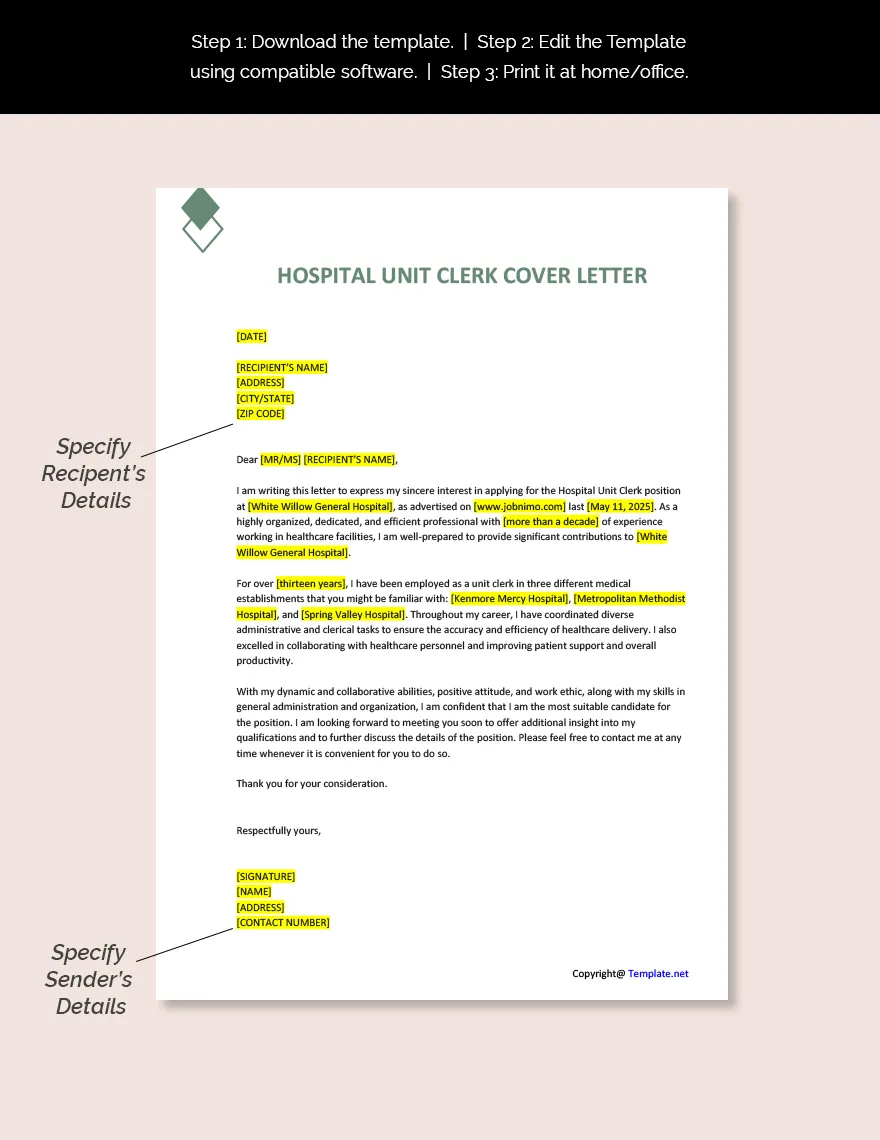Understanding the Unit Clerk Role
The unit clerk is a vital member of the healthcare team, serving as the central hub of communication and administrative support within a hospital unit or clinic. They play a crucial role in ensuring the smooth and efficient operation of the unit, which allows medical professionals to focus on patient care. This position demands a blend of organizational skills, attention to detail, and the ability to handle multiple tasks simultaneously. A well-crafted cover letter is your initial opportunity to make a lasting impression and convince the hiring manager that you possess the necessary skills and qualifications to excel in this role. It’s your first chance to demonstrate your knowledge of the position and convey your enthusiasm for the job.
Key Responsibilities of a Unit Clerk
Unit clerks are responsible for a diverse range of duties essential to maintaining a functional healthcare environment. These responsibilities generally encompass answering phones, managing patient charts and records, scheduling patient appointments, and ordering necessary supplies. They are also the initial point of contact for patients and visitors, greeting them, providing directions, and offering basic information. Accuracy in data entry and record-keeping is paramount, ensuring the integrity and confidentiality of patient information. Furthermore, unit clerks often assist with tasks such as insurance verification, billing inquiries, and other administrative duties connected to patient care. Their diligence and ability to manage these multifaceted responsibilities directly contribute to the unit’s overall efficiency and effectiveness.
Essential Skills for Unit Clerks
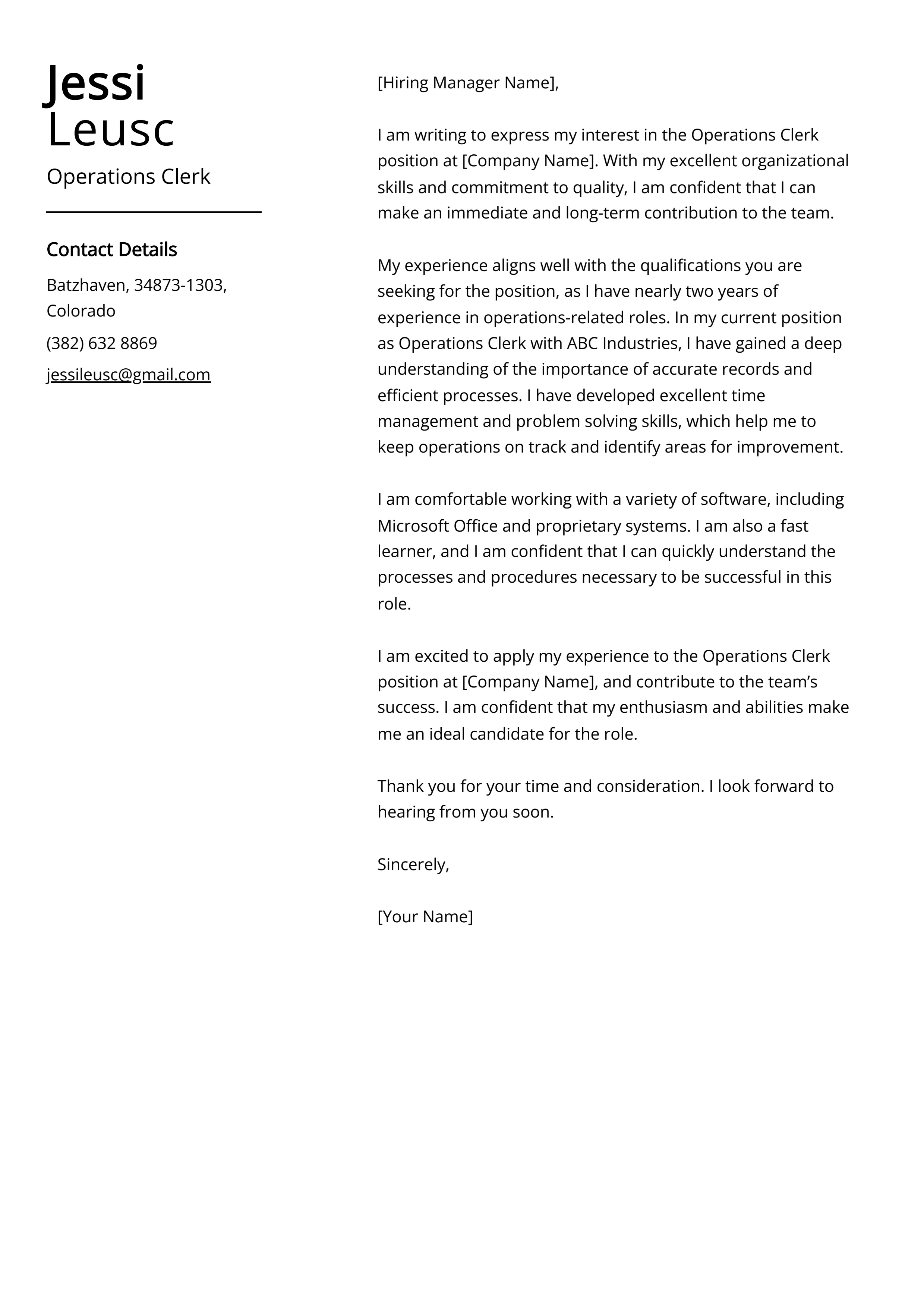
To thrive as a unit clerk, a specific skill set is essential. Strong communication skills, both verbal and written, are vital for effective interaction with patients, medical staff, and visitors. Proficiency in computer applications, particularly electronic health records (EHR) systems and the Microsoft Office Suite, is crucial. Excellent organizational skills, including the ability to prioritize tasks, manage time efficiently, and maintain meticulous records, are fundamental for ensuring accuracy and productivity. Unit clerks must be detail-oriented, with a strong commitment to maintaining patient confidentiality, as they handle sensitive information. Familiarity with medical terminology and basic medical procedures is often beneficial. A cover letter that emphasizes these key skills will resonate with potential employers and demonstrate your suitability for the position.
Crafting Your Unit Clerk Cover Letter
Crafting a compelling cover letter is the key to making a positive first impression. It should be well-structured, concise, and carefully tailored to the specific job description and employer’s needs. Your cover letter should complement your resume by providing additional context, showcasing your achievements, and demonstrating a clear understanding of the unit clerk role. By following a structured approach, you can create a cover letter that effectively communicates your skills, experiences, and your enthusiasm for the position, significantly increasing your chances of securing an interview. Remember, the goal is to create a letter that stands out, highlighting your unique qualifications and emphasizing how you can contribute to the team.
Header Section & Contact Information
The header of your cover letter should clearly display your contact information, including your full name, address, phone number, and a professional email address. Ensure that this information is current and accurate. Directly below your contact details, include the date and the hiring manager’s name, title, and the hospital or clinic’s address. If the name of the hiring manager is unknown, address the letter to “Hiring Manager”. Providing the correct contact information is the initial step in demonstrating your attention to detail and professionalism. It’s crucial to double-check all details to avoid any errors that could reflect poorly on your application. The format should be consistent, easy to read, and present a polished appearance.
Greeting and Introduction
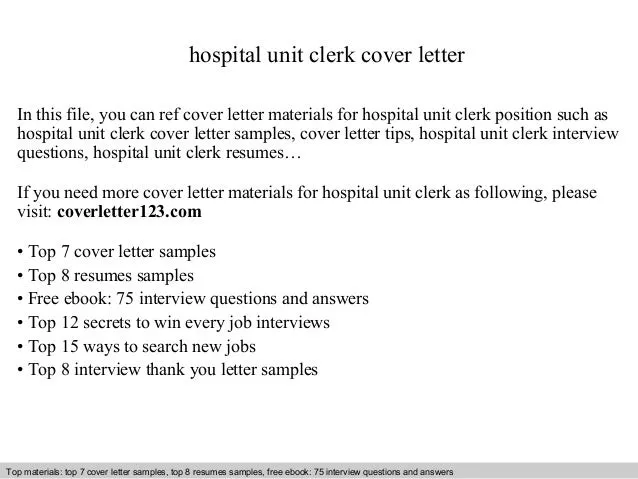
Commence your cover letter with a professional greeting, such as “Dear Mr./Ms./Mx. [Last Name]”. In the opening paragraph, state the position you are applying for and the source where you found the job posting. Briefly introduce yourself and express your genuine interest in the unit clerk position. Explain why you are particularly drawn to this specific role or the organization. This introduction serves to capture the reader’s attention and encourages them to continue reading. The introduction should be concise and convey your enthusiasm and intention to apply for the job, briefly mentioning the key skills you possess that correlate with the job description. This sets the tone for the rest of the letter.
Highlighting Relevant Skills and Experience
In the main body of your cover letter, highlight the skills and experience that closely align with the job requirements. Provide specific examples to illustrate your qualifications and demonstrate your abilities. Describe your previous experience in a similar role, emphasizing your accomplishments and responsibilities. Mention any relevant skills, such as proficiency with EHR systems, strong data entry skills, or a solid understanding of medical terminology. Connect your skills and experiences to what is asked of you in the job description. Tailor your cover letter to specifically address the needs of the position by using the keywords from the job description to demonstrate that you understand the role’s expectations. If you are new to the field, emphasize transferable skills like communication, organization, and attention to detail to demonstrate your capabilities.
Quantifying Achievements
Wherever possible, quantify your achievements to demonstrate your impact and the value you brought to previous roles. Use numbers and data to illustrate your accomplishments, such as “Managed over 50 patient records daily with 100% accuracy” or “Reduced patient wait times by 15% through efficient scheduling”. Quantifiable achievements make your cover letter more compelling and help the hiring manager to clearly see the tangible benefits you can offer. Provide concrete examples of how you have exceeded expectations, improved processes, or contributed to team success in prior positions. Specific data reinforces your claims and highlights your capabilities in a tangible way.
Tailoring to the Job Description
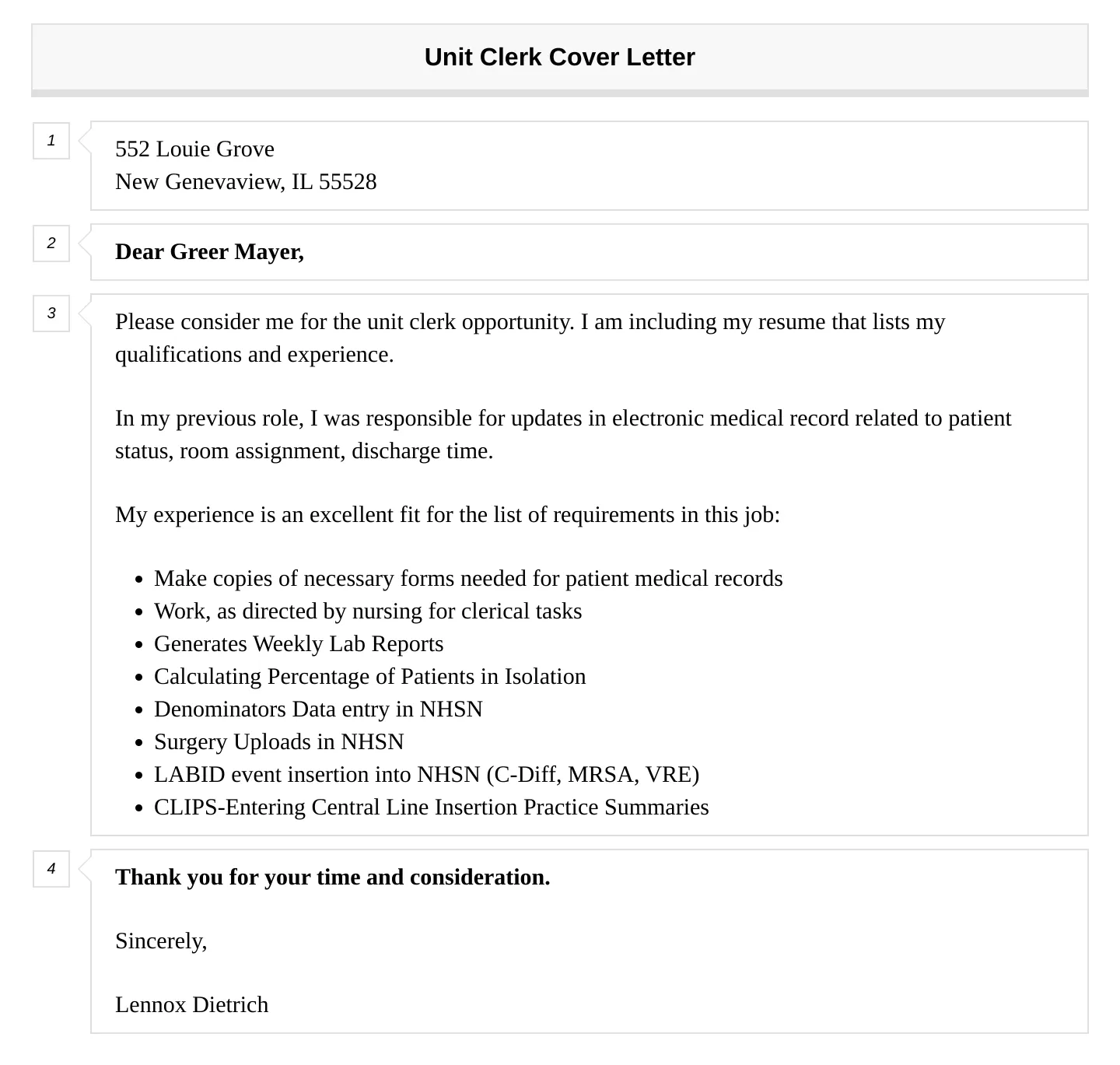
Thoroughly review the job description and customize your cover letter to directly match the specific requirements and expectations of the position. Incorporate the same keywords and phrases utilized in the job posting. This practice makes it easier for the hiring manager to immediately recognize that your skills and experience align with their needs. Address the key requirements one by one, offering explicit examples of how you have met those requirements in the past. Prior research on the organization is crucial; this displays your genuine interest in the position and indicates that you have taken the initiative to understand the company’s unique needs and values. Customize your letter to demonstrate how your abilities and experiences closely match the specific needs of the role.
Expressing Enthusiasm and Interest
Consistently express your enthusiasm for the unit clerk position and the specific organization throughout your cover letter. Explain what aspects of the role resonate with you and why you believe you would be a good fit for their team. Clearly convey your eagerness to contribute to the team’s success and support the healthcare professionals. Demonstrating your knowledge of the hospital’s or clinic’s mission and values is also beneficial. Your genuine enthusiasm will make your application stand out and create a positive impression on the hiring manager. Ensure your enthusiasm is authentic and reflects your sincere interest in the field of medicine and the commitment to patient care.
Call to Action and Closing
In the closing paragraph, include a clear call to action. Request an interview and express your availability for a meeting. Thank the hiring manager for their time and consideration. Reiterate your interest in the position and express your excitement about the potential opportunity to contribute to the team. Conclude your cover letter with a professional closing, such as “Sincerely” or “Respectfully,” followed by your typed name. This final step is crucial for completing the cover letter and making a strong final impression. This ensures your application is well-rounded and professionally presented, leaving a positive impression on the hiring manager and increasing your chances of moving forward in the hiring process.
Formatting and Proofreading
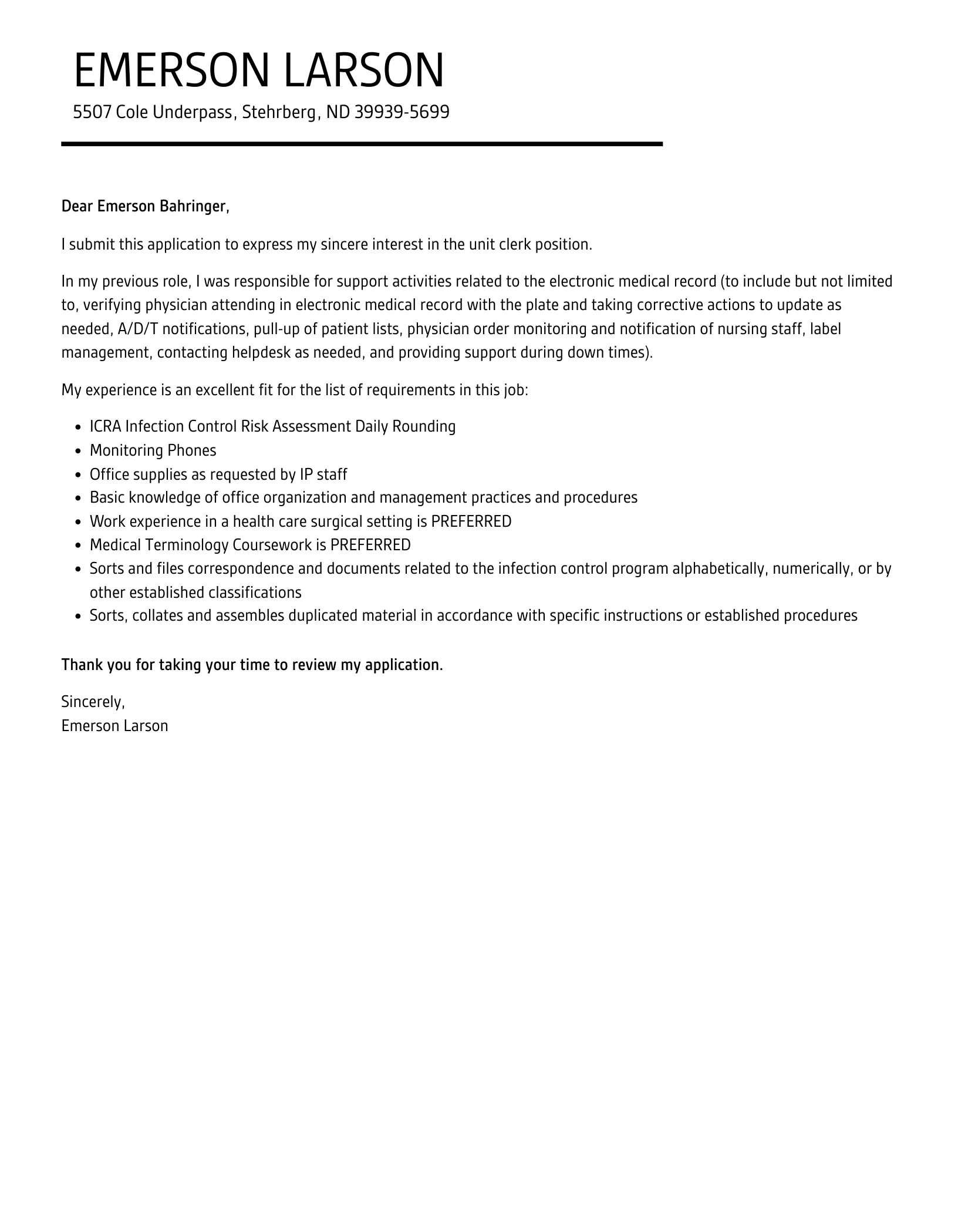
The overall appearance of your cover letter significantly impacts the impression you make on the hiring manager. A well-formatted and error-free document demonstrates professionalism and meticulous attention to detail, reflecting your organizational skills and ability to communicate effectively. Before submitting your application, it’s essential to carefully review your cover letter to ensure the design and formatting are well-crafted.
Formatting Guidelines
Use a professional font, such as Times New Roman, Arial, or Calibri, with a font size between 10 and 12 points. Maintain single spacing throughout the letter and ensure text is left-aligned. Ensure that the margins are set to one inch on all sides. Break up large blocks of text with clear, concise paragraphs. Utilize bold or italics judiciously to highlight key points, but avoid overuse. Strive for a clean, organized, and easily readable layout. Well-formatted content showcases your professionalism and demonstrates your ability to communicate clearly and effectively. Check the spacing between all elements, ensuring consistency. A poorly formatted letter can make the reader lose interest, or lead them to assume a lack of care on your part.
Proofreading Techniques
Meticulously proofread your cover letter to identify and eliminate any errors in grammar, spelling, and punctuation. Read your cover letter aloud to catch any awkward phrasing or potentially unclear sentences. Employ a spell-checker and grammar-checker, but do not rely on them exclusively. Enlist a friend, family member, or career advisor to review your cover letter for a second opinion. Eliminate all typos and grammatical errors to ensure the letter conveys your attention to detail. Ensure all contact information is accurate and current. Paying close attention to these details is key to showing that you are dedicated to securing the position and taking pride in your work. Errors can distract the reader or lead them to assume you lack the meticulous attention required for the role.
Common Mistakes to Avoid
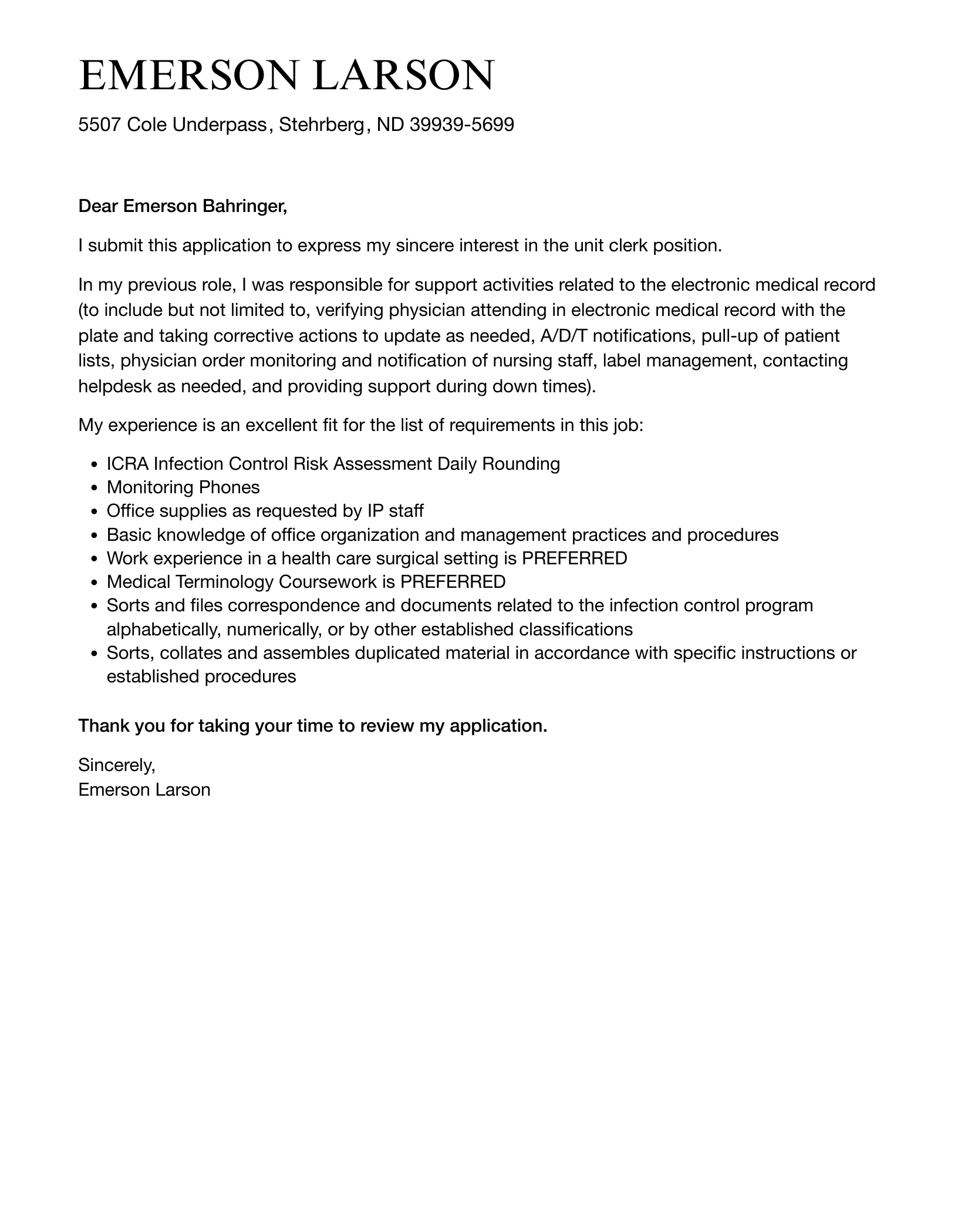
Certain common mistakes can significantly reduce your chances of successfully securing an interview. Being aware of these potential pitfalls will help you craft a cover letter that makes a strong, positive impression. By avoiding these mistakes, you can emphasize your strengths and qualifications, ensuring that your application stands out from the competition and conveys your suitability for the unit clerk role.
Generic Cover Letters
Avoid using generic cover letters. Always tailor your cover letter specifically to the job description and the particular organization. Generic cover letters frequently lack the personalization required to create a strong impact and make a positive first impression. Hiring managers can easily recognize a generic cover letter, which can lead to the immediate rejection of your application. Research the organization and customize your letter to directly address their specific needs and requirements, emphasizing how your skills align with the role. If your letter lacks any personal touches, the hiring manager might assume you are not genuinely interested in the position. Make sure to highlight the most important skills and experiences relevant to the job.
Typos and Grammatical Errors
Typos and grammatical errors can significantly undermine your credibility and make you appear careless and inattentive to detail. Thoroughly proofread your cover letter, and consider having someone else review it as well. Carefully review your spelling, grammar, punctuation, and capitalization. Even a single mistake can create a negative impression on the hiring manager. Use spell-check and grammar-check tools, but always double-check their suggestions. Attention to detail is an essential skill for unit clerks, so errors in your cover letter might suggest a lack of such skills, potentially leading to your application being rejected.
Ignoring the Job Description
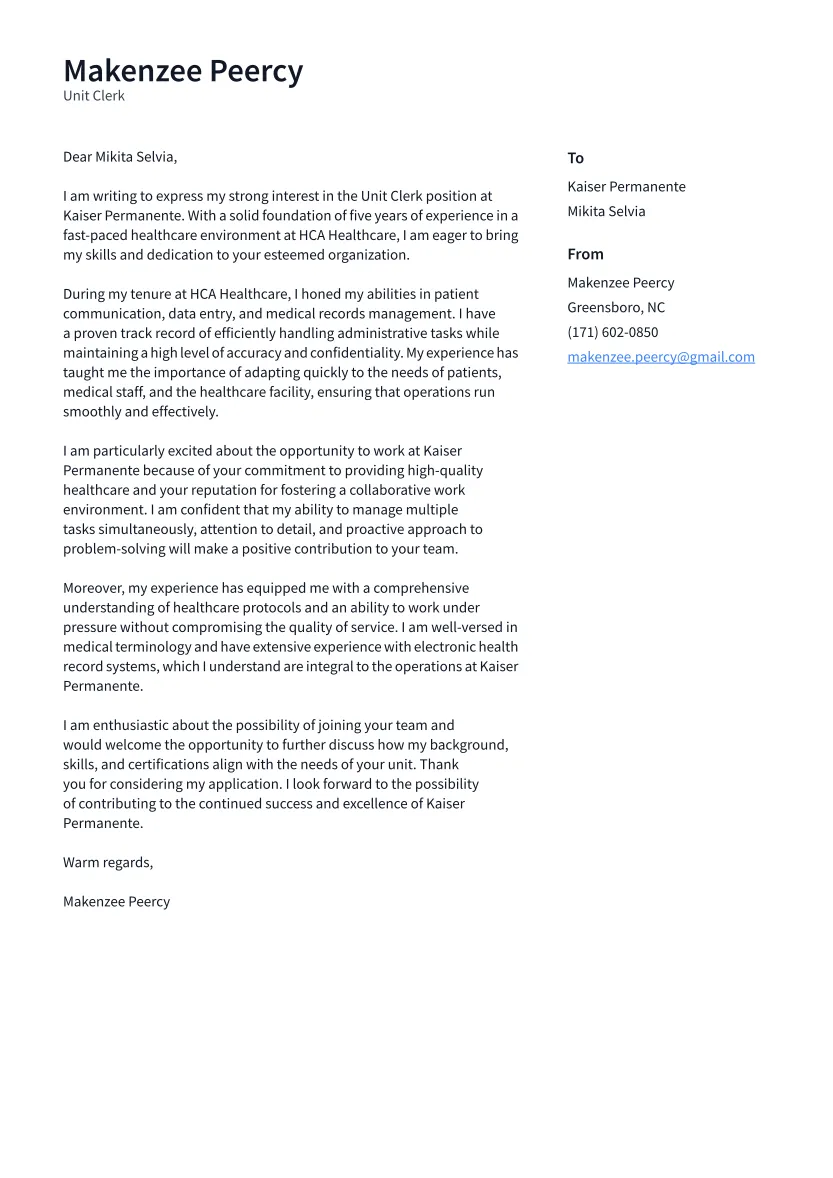
Do not ignore the job description. Your cover letter should directly correlate to the specific requirements and expectations of the role. Use keywords from the job posting to demonstrate that you understand the position’s requirements. Address the key requirements one by one and offer concrete examples of how you have met those requirements in the past. Customize your cover letter to specifically highlight how your skills, experiences, and qualifications align with the role’s particular needs and the organization’s priorities. Ignoring the job description will make it challenging for the hiring manager to assess your suitability for the position. Take the time to clearly show how your skills and experiences match the job’s needs, as this can significantly improve your chances of being offered an interview.
Showcasing Your Cover Letter
Your cover letter serves as a powerful marketing tool, enabling you to effectively present yourself as the best candidate for the unit clerk position. It should be a carefully constructed summary of your abilities and experiences that emphasizes how you can specifically benefit the organization. Focus on highlighting the aspects that make you unique and distinguish you from other applicants. When writing your cover letter, keep in mind the employer’s specific needs and requirements, and address how your skills, experiences, and qualifications align with those needs. Ensure your letter is well-written, engaging, and tailored to the specific role. Your cover letter is your chance to make a positive impression, so present yourself in the best possible light.
Submitting Your Cover Letter
Always adhere to the submission instructions provided in the job posting for your cover letter and resume. Ensure that your cover letter is in the requested format (e.g., PDF or Word document). Use a clear and professional file name, such as “Your Name_Cover Letter_Unit Clerk”. Before submitting, double-check all information to confirm its accuracy and completeness. Proofread the documents one final time before sending them. Submitting your cover letter correctly and following all instructions is a testament to your meticulous attention to detail and your respect for the application process. Always make sure to submit the requested information in the appropriate format, as failing to do so may result in missing out on a valuable interview opportunity.
Follow-up Strategies
If you have not received a response from the employer within a reasonable timeframe (typically one to two weeks), consider sending a polite follow-up email. In your follow-up, reiterate your interest in the position, and briefly mention your qualifications. Express your enthusiasm and willingness to provide any additional information or answer any questions. When you follow up, show that you are committed to the position and proactive about your application. It demonstrates you are organized by keeping track of your applications. Always remain professional and polite in all communications. If you do not hear back or receive a rejection, make sure you still thank them for their time and consideration.
